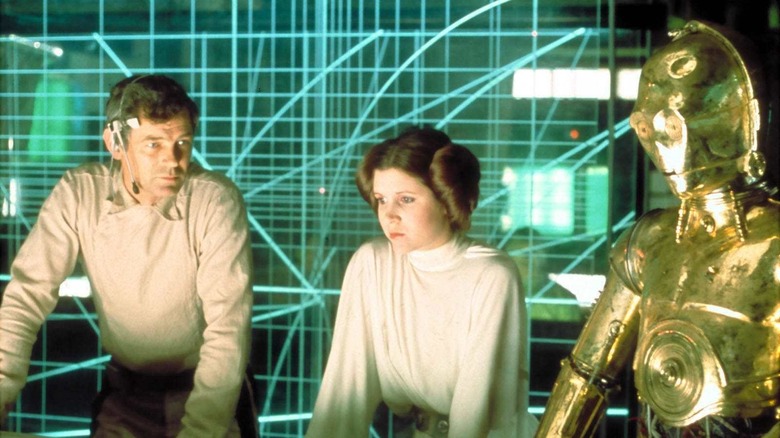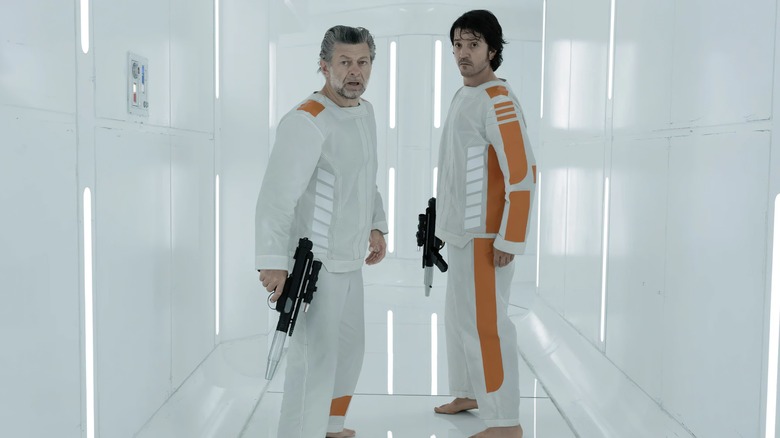Is Star Wars Really An Allegory For The Vietnam War?
Star Wars may seem mostly like a whimsical space opera about space wizards, giant monsters, and laser swords. And, well, yeah, it is that a lot of the time. But beneath the alien-to-Halloween-costume pipeline and the shiny veneer of Arthurian myth, the franchise also harbors some more subversive political themes and parallels.
George Lucas was always a political filmmaker. His first feature, "THX 1138," takes place in a dystopian future where emotions are controlled by forced drug consumption and children are raised in tubes. The original "Star Wars" isn't quite as explicit in its political commentary, but the pieces are there to put together, and Lucas himself has spoken frequently about the meaning behind the Rebellion and the Empire. While interviewing Lucas on AMC in 2018, James Cameron said, "The good guys are the rebels. They're using asymmetric warfare against a highly organized empire. I think we call those guys 'terrorists' today. We call them 'mujahideen.' We call them Al-Qaeda."
Lucas agreed with Cameron, adding, "When I did it, they were Viet Cong." He explained that the Vietnam allegory was front and center in his mind when making the original "Star Wars" in the mid-1970s, as was the American Revolution. "We're fighting the largest empire in the world, and we're just a bunch of hayseeds in coonskin hats who don't know nothing, and it was the same with the Vietnamese," Lucas said. "The irony of that one is, in both of those, the little guys won, and the big, highly technical empire — the English empire, the American empire — lost."
Star Wars has always been political at its core
In the same interview with James Cameron, George Lucas explained that his main interest in science fiction has never been the science portion. "I come out of anthropology," he said, "so my focus is social systems. In science fiction, you've got two branches. One is science, and the other is social."
As Lucas once explained in an interview with the Chicago Tribune, his original "Star Wars" script was motivated by both Vietnam and the growing scandals around then-president Richard Nixon. "It was really about the Vietnam War, and that was the period where Nixon was trying to run for a [second] term, which got me to thinking historically about how do democracies get turned into dictatorships?" Lucas said (via Time).
That focus became the basis for the entire Star Wars prequel trilogy — a story about a longstanding democracy corrupting itself through military imperialism. By the time Sheev Palpatine crowns himself emperor in "Revenge of the Sith," the system he's worked up through has become so intrinsically perverted that he's greeted with thunderous applause. Even Anakin's relationship with Padmé is an analogy for liberalism being seduced (and ultimately destroyed) by fascism.
Even after Lucas sold the franchise to Disney, these political undertones have continued to anchor the franchise. Most recently, the critically acclaimed Disney+ series "Andor" returned Star Wars to its revolutionary roots, dealing with themes like mass incarceration and Indigenous displacement and genocide. Showrunner Tony Gilroy said of his own inspiration in an interview with Deadline, "This is the Russian Revolution. This is the Montagnard. This is something interesting that happened in the Haitian Revolution. This is the ANC. Oh, this is the Irgun Building, Palestine. This is the Continental Congress."

